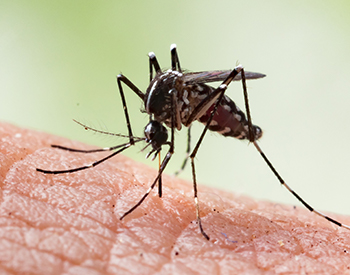Now that it is springtime, and summer is right around the corner, there is going to be a lot of time spent outdoors. With this, there will be more exposure to the creepy crawlies of nature. Most of the times they are just a nuisance, but to some, they
can cause serious allergic reactions. The CDC estimates that approximately 100 people die annually in the US from insect sting allergies.

One of the most notable insects that can be particularly annoying in this area is the mosquito. In addition to the annoying buzzing and biting, they can cause serious diseases such as West Nile virus, dengue fever, chikungunya, and in some countries malaria.
It is very rare for mosquitoes to cause a systemic allergic reaction such as anaphylaxis. When bitten the mosquito will release its stomach contents into the skin which will cause a reaction from proteins in the saliva consisting of histamine release
which leads to swelling and itching that is commonly seen. These reactions can be small or large, but usually only require supportive care unless there is a secondary infection. On the rare occasion, you can see something that has been coined “Skeeter
Syndrome” which consists of large local reactions with a fever that occurs soon after being bitten. It will mimic a secondary infection/cellulitis, but the onset is faster than is normally seen with infection. Again, it is very rare to have
anaphylaxis to mosquito bites, so there is no testing or definitive treatment for bites except avoidance and supportive care.
For those of you that like camping or hiking, ticks are something that you need to be conscious of too. Again, they are more of a nuisance, but they can carry and transmit serious infections. One called the lone star tick (Amblyomma americanum), can lead
to a condition called Alpha-Gal allergy, where one becomes allergic to non-primate mammalian meats such as beef, pork, lamb, and venison. Unfortunately, there is no current treatment for this condition. The best option currently is prevention of tick
bites.

The more serious threat from common insects, from an allergy standpoint, comes from the order Hymenoptera. This includes bees, wasps, hornets, yellow jackets, and fire ants. Like mosquitoes, a sting can cause a small or large local reaction which can
be treated with supportive care. However, these insects contain venom that you can develop a severe allergy to leading to anaphylaxis upon exposure. The American Academy of Allergy, Asthma, and Immunology (AAAAI)’s practice parameter on stinging
insect allergy estimates that the prevalence of systemic reactions to venom is around 0.5% to 3.3% (kids 0.15% to 0.8%) in the US. Bees, wasps, and hornets are easy to see and usually will not attack unless provoked. Yellow jackets and fire ants are
the more aggressive of the bunch and will attack unprovoked. Fire ants in particular are a problem in the southern part of the United States. They can easily come indoors unnoticed until it is too late. In any case, it’s recommended that those
with severe allergic reactions to stinging insects always carry two epinephrine devices with them. The good news is that venom allergy is very treatable with allergy shots. About 90% of patients that complete the recommended 3-5 years of venom allergy
shot treatment will not have a serious systemic reaction with subsequent stings.
Mother Nature is a fascinating and beautiful place that has many adventures to offer. Insect allergies should not deter you from enjoying all that nature brings. Careful planning and avoidance precautions can allow you to enjoy the good side of nature
without anxiety regarding the risks.